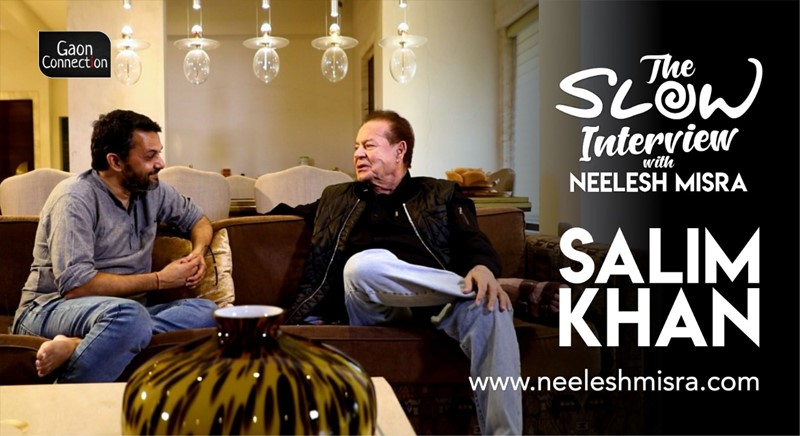Writer Salim Khan is a colossus in the writers’ world of Hindi cinema. With Javed Akhtar, he scripted some of the biggest blockbusters of the 70s and the early 80s, including Haathi Mere Saathi, Sholay and Deewar. He also happens to be the father of Bollywood superstar Salman Khan.
Salim Khan’s life has been full of ups and downs, where he has both found and lost love. He grew up in a 12-room home in Indore, and lost his mother when he was nine. He had not hugged her or gone close to her since he was five!
Also Read: A Raconteur, some raagas and Ronkini Gupta
“She had TB [tuberculosis] and it was very contagious. I could see her from a distance. She was kept in a small cottage and food would be sent to her. Her vessels were different. She would go to the hills in Nainital for four-five months in the summer. The monsoon and winter she would be with us,” he reminisced to Misra in The Slow Interview.
This was the time when tuberculosis also had another name — consumption — as it would consume people from within. “Death was a given. TB was a ticking time bomb,” Khan said.
Once, Khan was playing in the courtyard when he saw his mother on a chair. She beckoned him to get closer, and then stopped him. “Her face was expressionless, but tears poured out of her eyes,” he said.
Also Read: I am getting to know my mother, even more so, after her demise: Ali Fazal
Shortly after this, she died. Khan became very close to his father — he used to be scared of him till his mother was alive. “But, in two years, he died too. And, I decided that when I have children, they should never be afraid of me,” he said.
Even today, my children come to me for everything, including tattoos, Khan smiled. “They know now that there is no substitute for experience or education,” he told Misra, gently adding “They did not study!”.
Speaking of tattoos, Khan recalled the time when Arbaaz, his son, went to the tattoo studio sometime in 2016 and called his father asking what he should get inked. “I said, you’ve gone there without an idea? I told him to write on his shoulder: ‘Love each other or perish’. There’s no other way out to live this life,” Khan said.
Of laughter and forgiveness
Laughter comes easily to Khan. The ability to forgive and forget too. “I’m one of the happy people who has achieved much more than I expected to. I’ve lived in a guest house, then a garage converted into a cottage, small houses… After Zanjeer, I moved here [Galaxy Apartments in Bandra]. I saw the garden, I told myself this is the last house I’m going to move into. If I move elsewhere, I will feel out of place; I’ll be unhappy,” he added.
Khan could stay where he chose to — “In fact, Salman keeps telling me to move to a penthouse or to a bungalow. But, this is my house. I shifted here in 1973 and decided I would stay here henceforth,” he told Neelesh Misra in The Slow Interview that was recorded in 2019.
“In fact, because I don’t move, Salman has to stay here. He’s such a big star, but he stays in an apartment that does not measure more than a thousand square feet. Half of that is his gym. His clothes, shoes and he fit into the rest,” he laughed.
Also Read: Chulhe ki roti, temper talk and the lure of theatre: Sheeba Chadha
Khan spoke about his close-knit family, and about a topic not often discussed — the effect of gossip on families. He also opened up about how the family dealt with Salman’s 18-day imprisonment. “We felt guilty sleeping on a bed, or using the ac,” he recalled.
This was also when Khan wrote a short story ‘343’. “I went to visit Salman in prison in Thane, and everyone was calling out to one ‘343’. It turned out to be my son, now with a full beard. How easily a name can be changed into a number!”
Also Read: Some songs change our life. Some of our songs change others’ lives: Swanand Kirkire
The thing about film personalities of the past is their ability to speak home truths without flinching. “I don’t understand the jihad they speak of now. Jihad is an internal battle with whatever ails you. You’re trying to give up cigarettes or alcohol, that’s jihad. You better yourself in the process. And, acceptance is the first step in that road towards improvement,” he told Misra.
When a writing duo split
Speaking of his split with writing partner Javed, Khan said: “Even when we split, they did not ask how we thought; they were worried about who would write. Both our handwriting was bad. We would dictate. Writing is thinking, right?”
The writer duo was also famous for fighting for better payments to writers. “The fight was not just for money, it was for our status. We had to give reasons to get money due to us — it could be wanting to buy a train pass, pay the electricity bill or pay the school fees of our children. We fought for that. I once told someone there will come a time when a writer will get twelve lakhs for a script — equal to a star,” said Khan.
Did the split with Javed rankle? “Yes, but we have to go beyond it. He wanted to go, and for sometime you do feel bad, but you move on,” he told Misra.
“Yes, people fight, yes they argue, but love ultimately triumphs,” writer Khan told Misra.
Note: The Slow Interview with Salim Khan was recorded in 2019.













